
Members of the Poor Handmaids of Jesus Christ participate in a retreat on community-building. (Courtesy of Poor Handmaids of Jesus Christ)
Editor's note: Would you like to be a part of The Life? We're collecting applications for our next round of sister panelists to answer questions about how sisters approach aspects of religious life and other things. Read about how to apply. The deadline is Sept. 15.
(GSR logo/Toni-Ann Ortiz)
This month, the panelists reflected on how community stances evolve in chapters and general assemblies and how practical applications flow from them. Some dealt with the vows, others with social justice or spirituality and charism. A few went on to relate how decisions made in the deliberative bodies affect them personally, as they considered the following prompt:
Describe some ways that recent chapter directions or decisions have impacted your congregational life.
______
 Frances Hayes is a Presentation Sister living in Samson, Western Australia. With an academic background in education and history, she moved from primary education to religious education to administration in Australia and later became the English writer at the apostolic nunciature in Bangkok from 1995 to 2000. She then returned to Australia to minister as a support worker in aged care, a volunteer teaching assistant with refugee women and children, and a volunteer in an organization that builds connections with homeless and vulnerable people.
Frances Hayes is a Presentation Sister living in Samson, Western Australia. With an academic background in education and history, she moved from primary education to religious education to administration in Australia and later became the English writer at the apostolic nunciature in Bangkok from 1995 to 2000. She then returned to Australia to minister as a support worker in aged care, a volunteer teaching assistant with refugee women and children, and a volunteer in an organization that builds connections with homeless and vulnerable people.
In 1947, in referring to the vow of obedience, the constitutions of the Presentation Sisters used phrases like: "A Sister binds herself to obey the commands of the lawful Superior ... forever renounces her own will ... obey the Superior ... orders/commands of the Superior."
The vow of obedience emphasized maintaining structure and order within large groups of members and bringing about peace among diverse personalities.
When I entered in 1967 as a young, free-spirited, enthusiastic and strong-willed teenager, I read this and wondered what I had let myself in for. Dutifully but reluctantly, I memorized the constitutions and, after much time, reflection, prayer and heartache, came to internalize what obedience meant for my life.
In 1987, the language in our directives shifted to language like "deep in our hearts, by listening and responding, the whispering that is felt," and we were asked to respond to the cry of those made poor by "attending, seeking and answering" this call. Reading the letters of our foundress, Nano Nagle, we came to a deep awareness of her "listening heart," and we were asked to also become listeners. Obedience had moved from doing what another was telling us to focusing on what was happening within ourselves.
By 2007, the directives spoke more of "direction for mission," using active phrases as "we will" and "we are." Gone was the dichotomy of them/us, with one telling and the other doing. We realized that it is about us and how we continue the mission of Jesus. There was a shift to equality, sharing, collaboration for mission.
Advertisement
With the average age of our sisters being 78, in 2017, the focus of the discussions became "letting go" of congregational ministries and personal independence and about becoming "reservoirs of contemplative energy" and living with "God's loving gaze and compassionate hearts."
There is a greater demand for trust as we live, conscious of our frailty and not active in ministry, supporting the mission in a loving and prayerful relationship with God. Directives no longer focus on the nitty-gritty of daily life but call us to respond to the voice of God in prayer.
Gone is the vertical relationship of one commanding and the rest obeying, the one leading and the rest following. It is now a horizontal relationship of "We are all in this together."
Recently, in creating a proposal, I used a discernment process of listing the positive and negative reasons for doing it, and the positive and negative reasons for not doing it. In prayerful discussion, the best option became apparent. With the onset of COVID-19, all plans were changed, but I remain in peace. A greater One has made the decision.
Our daily ongoing decisions continue to bring about the reign of God. Obedience remains a vow for all religious, but as a vow of listening and hearing God's voice in prayer.
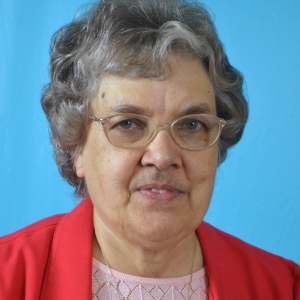 Joetta Huelsmann is a member of the Poor Handmaids of Jesus Christ in Donaldson, Indiana. Early ministries included teaching, religious education, and parish pastoral associate; later, she was co-director of a personal growth center, a staff member/spiritual director of a house of prayer, and the director of a retreat center. She is now serving as provincial councilor of her congregation, responsible for associates, communications, the justice office and other community programs.
Joetta Huelsmann is a member of the Poor Handmaids of Jesus Christ in Donaldson, Indiana. Early ministries included teaching, religious education, and parish pastoral associate; later, she was co-director of a personal growth center, a staff member/spiritual director of a house of prayer, and the director of a retreat center. She is now serving as provincial councilor of her congregation, responsible for associates, communications, the justice office and other community programs.
One of the calls of our 2017 chapter was: "We call ourselves to be a discerning Province in contemplative dialogue by engaging in processes that honor these values." As a result, the pathway of contemplative dialogue and communal discernment was established to deepen our contemplative dialogue and communal discernment practices.
We began by educating ourselves, meeting on a monthly basis. The guidelines for contemplative dialogue were adapted from the Leadership Conference of Women Religious. Each of us watched the video on the LCWR website to review the practice. Our goal was to live as contemplative women and to speak from our heart rather than from our head.

Members of the Poor Handmaids of Jesus Christ converse during a retreat on community-building. (Courtesy of Poor Handmaids of Jesus Christ)
One of the definitions we adopted for contemplative dialogue was: "It is a way of being together, a way of engaging in meaningful conversations that are rooted in deep listening. We listen from an inner silence that creates a space where something new can emerge."
We also drew on resources from the Institute for Communal Contemplation and Dialogue, as well as "The Many Faces of Contemplation," available through LCWR's website.
In our first meeting, we shared how we already use this dialogue in our lives. We spoke of previous chapters of elections and how contemplative dialogue brought each table of sisters to the same conclusion.
As a pathway, we explored the statement of our foundress in 1842: "The purpose of our society is the propagation of virtue through example, instructions and prayer." When St. Maria Katharina Kasper was canonized, we asked: "What does the canonization of St. Katharina Kasper mean for the whole world?"

An exercise at a Poor Handmaids of Jesus Christ retreat on community-building (Courtesy of Poor Handmaids of Jesus Christ)
When we felt comfortable practicing contemplative dialogue among ourselves, we held a session at our summer Community Days with all our sisters addressing a question about interculturality. Sisters were open and received this process with trust. One of the "we" statements that emerged was: "We need to dialogue on a deeper level with the international sisters with whom we live."
At one of our later pathway gatherings, we had a guest speaker share with us on different processes of communal discernment. As a group, we have learned much and know that we still can deepen these practices both in our individual lives and communal lives.
Our general chapter has challenged us to be a "Community of Communion," so what we are learning can also be used in our local convents to deepen our relationships with each other.
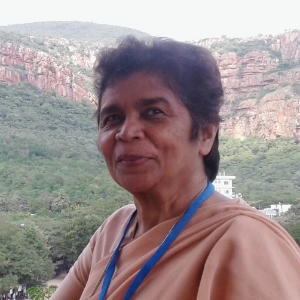 Teresa Joseph is a Salesian Sister in Mumbai, India. With extensive academic work from universities in Rome, she has taught university courses, held diocesan and congregational offices, revised catechetical texts, and launched many creative programs for teachers, parents and students. Currently, she is animator of the community at Auxilium Convent, Lonavala. She takes every opportunity to work with children who live in the streets.
Teresa Joseph is a Salesian Sister in Mumbai, India. With extensive academic work from universities in Rome, she has taught university courses, held diocesan and congregational offices, revised catechetical texts, and launched many creative programs for teachers, parents and students. Currently, she is animator of the community at Auxilium Convent, Lonavala. She takes every opportunity to work with children who live in the streets.
A process of change was begun in our provinces after our Salesian General Chapter XXII in 2014. We accepted the changes as a life project that directs us along the path of holiness and as the criterion that enlightens and guides our personal and community choices.
For example, we studied an item in our chapter documents: "processes of change brought about in the province through the living of poverty and the sharing of goods." Our province decided to introduce budgeting very systematically at the provincial, community and personal level. Many seminars were held to train animators, bursars and sisters, and communities were encouraged to live the culture of self-limitation and solidarity by contributing generously toward relief works (e.g., Haiti, Sri Lanka) and toward the needs of the missions, the local church and the nation.

Twitter thread from Zimbabwe President Emmerson Mnangagwa
As a result, we have pooled more resources and shared more monetary resources with the congregation at all levels. We have shared human resources with the church and the congregation. We have made administrative changes that offer concrete options for solidarity with the poor. Other changes facilitate decentralization and transparency of administration. Sisters in administrative jobs have been given specialized training.
An option for personal budgeting has created a mentality for responsible choices, and a frequent evaluation of our living of poverty has made us more aware of the cost of living and stimulated us to limit our needs and be moderate in the culture of gifts. We are opting to keep our celebrations simple to be in solidarity with the poor.
With a mandate from General Chapter XXIII, in 2017, "Guidelines for the Management of Goods in the FMA Institute" came to life. It reiterated to the entire institute the need for a commitment to an effective sharing of goods, so as to be a prophecy of fraternity in a world where poverty, inequality and injustice are growing and where new emergencies are on the rise.

Schoolchildren greet Salesian Mother General Sr. Yvonne Reungoat at the Salesian General Chapter XXII in 2014. (Provided photo)
We are learning to pool resources, to understand the charismatic roots of finances in our institute, gaining a clear understanding of poverty as a guarantee of fidelity and fruitfulness — a choice of freedom directed to the service of the young. Personal and community poverty gives us an experience of solidarity and sharing.
And there was another effect on me: The provincial council had nominated me to be moderator of the 2013 provincial chapter, and the participants of that chapter chose me as delegate of the province to General Chapter XXIII. Serving in this way made me even more passionate about rediscovering the original splendor of the Salesian charism and the lasting freshness of my following of Jesus.
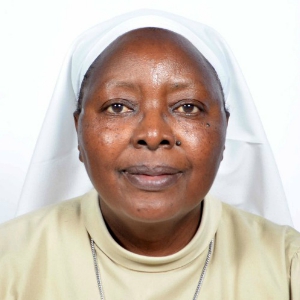 Bibiana Ngundo is a member of the Little Sisters of St. Francis in Kenya. After graduate studies, she was a visiting scholar at the Center for Applied Research in the Apostolate (CARA) in Washington, D.C., and is currently a lecturer in African culture and religion at the Catholic University of Eastern Africa. Her current academic interests include collaboration between Catholic sisters and the Archdiocese of Nairobi, Kenya, and issues centering on indigenous women religious in Africa.
Bibiana Ngundo is a member of the Little Sisters of St. Francis in Kenya. After graduate studies, she was a visiting scholar at the Center for Applied Research in the Apostolate (CARA) in Washington, D.C., and is currently a lecturer in African culture and religion at the Catholic University of Eastern Africa. Her current academic interests include collaboration between Catholic sisters and the Archdiocese of Nairobi, Kenya, and issues centering on indigenous women religious in Africa.
The Little Sisters of St. Francis are an institute of diocesan right. Since its establishment in 1923, the institute has had 16 chapters, the last in 2016. In most of these chapters, new leadership is either elected into office or the former reelected. Due to the diversity of cultures from our three East African countries of Uganda, Kenya and Tanzania, elections tend to align with this diversity. In 2016, chapter delegates evaluated many areas of the life of our community, to either confirm them or propose changes.
The beatification cause of our foundress, Mother Mary Kevin Kearney, was the breaking news at the chapter. During this chapter, it was officially announced that the course of her beatification was in the "Roman phase," which invites several activities, including ardent prayer even beyond the usual prayer practices of the sisters.
In response, special prayer cards were printed and distributed to convents and parishes in all three of our African countries. By these prayers, all favors received through Mother Kevin's intercession are to be reported to the overall beatification committee.
So far, many testimonies have been recorded and forwarded to Rome. The sisters have found in Mother Kevin, servant of God, a source of breakthrough for their prayers as communities and individuals invoke her intercession.
The chapter further focused on the spiritual renewal of members as a way of strengthening our vocations. This was achieved through providing accessibility to the Code of Canon Law, Vatican II documents, the revised Catechism of the Catholic Church, spiritual direction, workshops, conferences, spiritual reading, daily adoration of the Blessed Sacrament, contemplation and other forms of prayer.
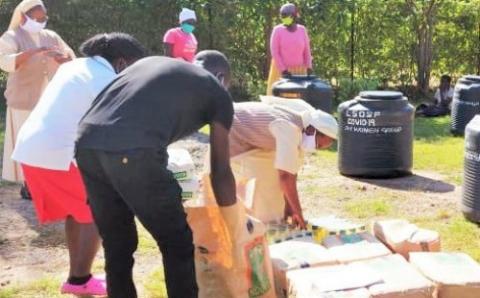
Little Sisters of St. Francis serve in solidarity with the poor and needy during the COVID-19 pandemic. (Provided photo)
These practices have resulted in an increasing desire among the sisters for personal and institutional renewal. Members have become more vibrant in their apostolates. There is desire for specific growth practices such as special retreats, workshops (e.g., about family trees), Franciscanism and knowledge of Mariology.
There has been more emphasis on our vowed life as centered on the institute's life and charism. In poverty, we share our temporal and spiritual goods. In chastity, we reach out to the poor with compassion and love. In obedience, we remain open to the voice of God in readiness to do his holy will. During this pandemic, sisters in different areas have become active in solidarity with the poor and needy.
 Barbara Valuckas, a School Sister of Notre Dame currently based in Connecticut, has a communications background. She taught in schools and via educational television in the Diocese of Brooklyn, New York. Both before and after serving in province leadership as councilor and provincial leader, she has been ministering as a facilitator and consultant for parishes in the United States and with religious congregations internationally.
Barbara Valuckas, a School Sister of Notre Dame currently based in Connecticut, has a communications background. She taught in schools and via educational television in the Diocese of Brooklyn, New York. Both before and after serving in province leadership as councilor and provincial leader, she has been ministering as a facilitator and consultant for parishes in the United States and with religious congregations internationally.
We deepen our consciousness of who we are in relationship with the Triune God, one another, and God's amazing universe, particularly through theological reflection on the Trinity.
That was one of seven direction statements from our School Sisters of Notre Dame international general chapter in 2017. The other six directions challenged us to reach outward both in community life and in response to global concerns. This direction draws us within to explore and stretch the depths of a consciousness that gives meaning and energy to our outward actions in the service of love and justice. All of the directions were strongly influenced by the 2015 publication of "Laudato Si' on Care for Our Common Home," which offered the world a vision of the profound interconnectedness of all being.
The committee formed to guide the implementation of this direction began by inviting our members in North America, Japan, Guam and Africa to share what would help them to live this direction. The responses were varied:
- Move beyond what was learned in our formation years.
- Replace staid images of the Trinity, such as the "two men and a bird" image named by theologian Immaculate Heart of Mary Sr. Sandra Schneiders.
- Delve deeply into the cosmic and mystical dimensions of the Trinity in a way that would impact our relationship with God, the universe and all life.
The whole spectrum of needs and desires was shared with a team of School Sisters of Notre Dame spiritual directors, who then confirmed the deep desires for an updated theology of the Trinity in light of an evolving view of the cosmos, coupled with a longing for deep prayer and action that could respond to the suffering of the world and its cries for justice.
The committee established a website to hold and share resources on the Trinity and began to plan a culminating symposium event, the exact details of which are still in process because of COVID-19 uncertainties. Both the event and the website needed a logo that would hold the deeper meanings embedded in the chapter direction. This is the logo that emerged from the submissions of the sisters and the explanation that appeared on the website:

Some contemporary theologians affirm that the first revelation of our Triune God was in creation, where everything is in relationship through the interconnected energy of love. This concept is reflected in the logo for the SSND Symposium on the Triune God. Within an oval shape representing the orbits found in our multiverse, there are images of the cosmic explosion and the interconnected spiral found in all of nature (although sometimes invisible to the naked eye). The placement of the text extends the spiral into the symposium, which will invite us further into the mystery, energy, relationship, movement, oneness and love of the Triune God.
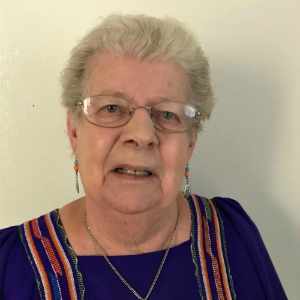 Marie Vianney Bilgrien is a School Sister of Notre Dame living in El Paso, Texas. She taught grade school in Wisconsin and Mississippi and served in Bolivia as a catechist and in Guatemala as the director of an orphanage. She directed Hispanic ministry for the Diocese of Baker, Oregon, and worked in higher education in Shreveport, Louisiana, and El Paso. After she received a Doctor of Sacred Theology from the Angelicum in Rome, she began work with the Graduate Theological Foundation and the University of Texas at El Paso.
Marie Vianney Bilgrien is a School Sister of Notre Dame living in El Paso, Texas. She taught grade school in Wisconsin and Mississippi and served in Bolivia as a catechist and in Guatemala as the director of an orphanage. She directed Hispanic ministry for the Diocese of Baker, Oregon, and worked in higher education in Shreveport, Louisiana, and El Paso. After she received a Doctor of Sacred Theology from the Angelicum in Rome, she began work with the Graduate Theological Foundation and the University of Texas at El Paso.
Editor's note: This submission has been updated to correct inaccurate statements from an earlier version.
The rule of the School Sisters of Notre Dame, approved in 1986, is called "You Are Sent." Every time I read it, I am surprised at how it continues to call us into the future, beginning with words from our foundress: "All the works of God proceed slowly and in pain; but then their roots are the sturdier and their flowering the lovelier."
The Central Pacific Province has 846 sisters and more than 330 associates. Our mission continues through sponsored, co-sponsored and affiliated ministries, associates and donors. We have been diligent in sharing our spirituality and charism with all these groups. Though we are primarily an educational order, the School Sisters of Notre Dame serve in a variety of ministries, grounded in the concept of transforming the world through education in the broadest sense.
The theme of our international 24th General Chapter, held in the fall of 2017, was: "Trust and Dare. Content with little, we joyfully direct our entire lives toward that oneness for which Jesus Christ was sent." The fruit of the chapter is our directional statement "Love Gives Everything."
Our provincial assembly meets three times a year and discusses topics and themes from our international chapter. In turn, groups of 20 to 40 sisters, called "extended assemblies," meet to continue the dialogue about the implementation of the directional statement.

School Sisters of Notre Dame meet in St. Louis for a general chapter, "The Assembly of the Whole," to discuss future decisions in the Central Pacific Province. (Provided photo)
Our general chapters have greatly influenced us over the years. After the 1992 chapter, we established Shalom, an international network for justice, peace and the integrity of creation for the community. Each sister is a member, and the network is guided by an international coordinator and five continental branch representatives working with contact sisters in every country where sisters minister.
We are also a nongovernmental organization accredited since 1994 by the United Nations. We focus our advocacy and educational efforts primarily on issues related to the rights of girls, women and those who are poor, especially their right to education, economic justice and sustainable development.
Over the years, province committees have been formed to work on peace and justice issues, like care of creation, anti-trafficking, immigration and racial justice. The province has spent two years producing a corporate stance on Gospel nonviolence and just peace, incorporating theological reflections, articles, talks, videos, questions for personal reflection, sacred Scripture, possible actions and prayers. Each sister becomes involved in one or more aspects of the stance and its implementation.
This stance is one way in which we are living out our general chapter call to educate, advocate and act in collaboration with others for the dignity of life and the care of all creation. We are committed to a more just and peaceful world, and we are called to take a clear stand for creative and active nonviolence and against all forms of violence.







